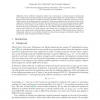Free Online Productivity Tools
i2Speak
i2Symbol
i2OCR
iTex2Img
iWeb2Print
iWeb2Shot
i2Type
iPdf2Split
iPdf2Merge
i2Bopomofo
i2Arabic
i2Style
i2Image
i2PDF
iLatex2Rtf
Sci2ools
124
click to vote
ASIACRYPT
2008
Springer
2008
Springer
Chosen Ciphertext Security with Optimal Ciphertext Overhead
Every public-key encryption scheme has to incorporate a certain amount of randomness into its ciphertexts to provide semantic security against chosen ciphertext attacks (IND-CCA). The difference between the length of a ciphertext and the embedded message is called the ciphertext overhead. While a generic brute-force adversary running in 2t steps gives a theoretical lower bound of t bits on the ciphertext overhead for IND-CPA security, the best known IND-CCA secure schemes demand roughly 2t bits even in the random oracle model. Is the t-bit gap essential for achieving IND-CCA security? We close the gap by proposing an IND-CCA secure scheme whose ciphertext overhead matches the generic lower bound up to a small constant. Our scheme uses a variation of a four-round Feistel network in the random oracle model and hence belongs to the family of OAEP-based schemes. Maybe of independent interest is a new efficient method to encrypt long messages exceeding the length of the permutation while re...
Related Content
| Added | 12 Oct 2010 |
| Updated | 12 Oct 2010 |
| Type | Conference |
| Year | 2008 |
| Where | ASIACRYPT |
| Authors | Masayuki Abe, Eike Kiltz, Tatsuaki Okamoto |
Comments (0)

